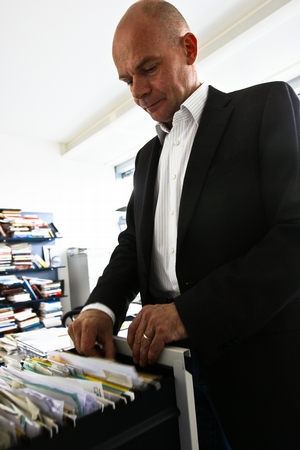Fraud, lies and documents
The journalist Hans-Martin Tillack went to Brussels to do what he thought was his job. He ended up in jail, and in trouble with the European Commission.
 xxx  Confiscated: In March 2004 Belgium police confiscated journalist Hans-Martin Tillacks whole archive after a series of critical articles about Eurostat. After defeating the police in the European Court of Human Rights in Strasbourg in February this year, Tillack is still missing some of his copies of his documents. Photo: William E. Graham. |
It's seven o’clock in the morning. Hans-Martin Tillack, the correspondent of the german Stern Magazine in Brussels, is fast asleep after a farewell dinner with some colleagues leaving Belgium for their home countries. The doorbell rings. Tillack think someone must have mistaken his doorbell, ingnores it, tries to get back to sleep. The doorbell rings again. Tillack is annoyed. Can’t they just go away? On the third ring Tillack opens the door wearing nothing but his pyjamas. Outside the door, six plain clothed men, introducing themselves as officers of the Belgian Federal Police are awaiting. They briefly show Tillack a search warrant claiming they have been sent by the EU Anti-Fraud Office (OLAF), and ask him who has passed him some highly confidential documents about fraud and irregularities in the European Commission. They claim Tillack has bribed an official to obtain these documents, and start picking up all sorts of things in his flat. – This must be a bad dream, Tillack thinks.
Not ashamed
What happened in Brussels that morning in march 2004 was no bad dream. The policemen were carrying out Hans Martin Tillacks private computer, mobile phones, diary and address book, as well as his bank account statements and a copy of the book “Spaceship Brussels”, a book about EU he had finished a year earlier together with the journalist Andreas Oldag, an old colleague. Tillack was put in the back of an old police car and driven to the Stern office in the Brussels International Press Centre. – With a lot of police officers surrounding me, the police told me that they thought I would be ashamed of the situation. They tried to prevent me from talking to other journalists, but I was so scandalised of the prerequisite and understood that what I needed at the moment was a lot of attention from the journalists, Tillack describes. When a colleague from the German magazine Focus passed by, Tillack asked him to call both the Stern headquarter in Hamburg, news agencies and the Brussels office of the newspaper his wife was working for. The colleague acted upon the request. Press conference in the mens room As Tillack was lead into his office at the press centre, a group of journalists were gathering outside his office, putting some pressure on the investigators inside. Not allowed to talk to anyone, Tillack was stuck inside the office. – After half an hour, I was able to sneak out, claiming that I had to go to the toilet. On the way to the toilet I spoke to the journalists telling them what was going on, Tillack recalls. Back at the office the police officers wanted to bring all Tillack’s papers with them, only to discover that they hadn’t got any boxes to bring them in. – As I had some boxes at my office from moving to Brussels, they tried to use my boxes to bring out my stuff. I had to tell them that they were my boxes, and finally they got some boxes organized themselves, to bring out my stuff. During the scene at the office, one of the police officers told Tillack that he was lucky that he was a journalist in Belgium, not in Burma, where he as a journalist would have been treated a lot worse. When Tillack wanted to call his wife, they refused him this, claiming that he hadn’t been cooperative enough.
Still problems
After the raid, the Belgium police returned the majority of Tillacks documents, but kept about a thousand pages. The documents were kept until Tillack and Stern defeated the police in the European Court of Human Rights in Strasbourg this February after loosing in the EU Courts, then the originals were returned to Tillack and Stern. – Unfortunately, they had given a complete set of copies to the prosecutor in Hamburg. What’s worse, a number of copies of the documents were given to OLAF officials, and we’re now trying to get all the copies back, but it’s hard work, Tillack explains. – How did your sources react to this? – Luckily it went well. But I knew, off course, that these documents I had gathered over two years were sensitive, and I was handling my sources with great care. Some of my sources were not even in my telephone book, the names were not on my computer and it was impossible to trace the documents back to anyone. As a journalist you have to be careful, but when the police show up, claiming your whole archive, you can never really be sure. After the raid, Belgium has paid damages to Hans-Martin Tillack and Stern magazine.
Hans-Martin Tillack
• German journalist currently working at Stern magazine office in Berlin, Germany.
• Sterns correspondent in Brussels 1999 – 2004.
• Exposed a number of examples of fraud and corruption among EU officials, most significantly the “Eurostat Scandal”.
“Eurostat Scandal”
• In 2000 internal auditors were raising concerns about Eurostats contracts with outside companies. Eurostat is the official bureau of statistics for the European Union.
• According to the auditors, funds paying for statistical services were placed into different funds that Eurostat officials benefited from.
• The European Anti-Fraud Office, OLAF, did not react to these concerns.



